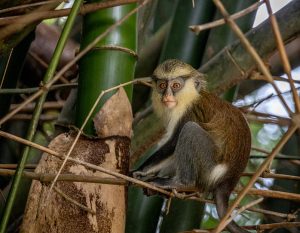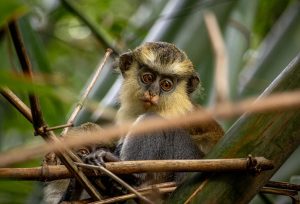From forests around the world such as the Amazon, to the rainforests in West Africa, animals are disappearing at alarming rates. Human activity is found at the core of this matter; primates experiencing habitat loss, climate change, hunting and illegal trade. In Ghana, efforts are being made to combat the loss.

Approximately 64% of all primate species face extinction, according to the International Union for Conservation of Nature. In Ghana, primate conservation is vital for protecting the country’s rich biodiversity and delicate web of life that supports the country’s unique ecosystems, as they play a role in seed dispersal and forest regeneration. Ghana is home to several endangered species, including but not limited to, the White-naped mangabey monkey.
The Accra Zoo is known as the Accra Zoological Garden, and hosts a collection of wildlife from Ghana and different species from around the world. The zoo specifically focuses on the rehabilitation and reintegration of White-naped Mangabey, back into the wild.
Only 1,000 White-naped Mangabeys remain in the wild today, according to Akowiah, making them one of the most endangered primates in West Africa, alongside the Roloway monkey, and the White-Thighed Black-and-White Colobus. These primates are battling against extinction.
The Accra Zoo currently holds 24 adult White-naped Mangabey monkeys, of whom they are breeding and in the process of working towards integration into the wild.
“The plan is that they (zoo employees) breed them in the Accra Zoo and then we reintegrate them into their natural habitat,” says Raymond Akowiah, a tour guide and administrative assistant at the Accra Zoo.

The plan for reintegration was championed by an NGO called West African Primate Conservation Action, also known as WAPCA.
WAPCA focuses on working towards the conservation of endangered primates. This includes the Roloway Monkey, White-naped Mangabey and the White-Thighed Black-and-White Colobus monkey. WAPCA states their overall mission is to “Discover, Protect, Reinforce and Connect” as listed under their website.
This is the organisation that partners with the Accra Zoo in its efforts to reintegrate White-naped Mangabeys into their natural habitat. This critical mission gives hope to save the species from its declining numbers. The Accra Zoo’s other conservation efforts include education.
“Wildlife education has helped to promote wildlife welfare,” says Akowiah. The Accra Zoo helps with different wildlife clubs that are at Senior High Schools and Universities. Their goals are to educate the young generation on the welfare of wildlife and the conservation of species.
Moving forward, these initiatives will provide a basis for the protection and conservation of primate species in the world, and especially in Ghana. The Accra Zoo and WAPCA stand as examples of what collaboration can lead to, a dedication to protection in the face of biodiversity loss.
This work will not only help safeguard endangered species like the White-naped Mangabey, but also educate generations moving forward in Ghana. As human-driven threats continue to endanger primates on a global scale, it is crucial to continue conservation efforts, such as those we see in Accra.
The loss of primates affects our ecosystems and biodiversity, not only in Ghana but around the world. In Accra, these efforts are being taken seriously at the Accra Zoo with programs like WAPCA. Continued efforts will be essential to expanding conservation.
Public awareness and long-term commitment can ensure that species, such as the White-naped mangabey not only are preserved, and their numbers rising, but are also thriving once again in the wild. The work in Ghana, however large or small it may be, serves as a reminder that it is still possible to rewrite the endangered future for primates.
By Anna Liv Myklebust










